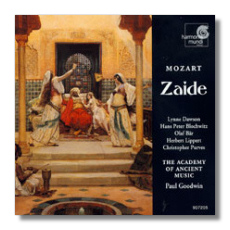
The Internet's Premier Classical Music Source
Related Links
- Mozart Reviews
- Latest Reviews
- More Reviews
-
By Composer
-
Collections
DVD & Blu-ray
Books
Concert Reviews
Articles/Interviews
Software
Audio
Search Amazon
Recommended Links
Site News
 CD Review
CD Review
Wolfgang Mozart

Zaïde, K. 344
- Zaïde - Lynn Dawson, soprano
- Gomatz - Hans Peter Blochwitz, tenor
- Allazim - Olaf Bär, bass-baritone
- Sultan Soliman - Herbert Lippert, tenor
- Osmin - Christopher Purves, bass
Academy of Ancient Music/Paul Goodwin
Harmonia Mundi HMU907205 recorded June 1997
The circumstances under which Mozart started to write uncompleted Singspiel Zaïde, some time in 1779 or 1780 in Salzburg, are not clear. It may have been in an effort to get a hearing at the new German Theater in Vienna, but by 1781 he realized that a serious opera of this kind was not suitable, given the Viennese preference for comedy. He then abandoned the project, and it was not staged until 1866 in an adaptation by Gollmick, with an Overture and closing section by Johann Anton Andrè. Further adaptations followed, but the version presented here consists only of the music Mozart wrote, adding up to about 80 percent of what the completed opera might have contained.
The libretto, by the Salzburg court musician and family friend Johann Andreas Schachtner, is for the most part based on Das Serail by Haydn's librettist Franz Karl Frieberth, published in 1779, and itself based on a text by the theater manager Franz Josef Sebastiani. Plots involving Europeans enslaved by the Turks were popular at the time (e.g., Voltaire's Zaire, which was performed in Salzburg in 1777 with incidental music by Michael Haydn), because they not only provided an interestingly exotic setting but also, by portraying the Turkish rulers as more magnanimous than their European counterparts, allowed for a kind of social criticism that would not otherwise have been permitted. Here we find Zaïde and Gomatz, captured and enslaved by Sultan Soliman, who fall in love and plan their escape with the seraglio guard, Allazim; captured, their pleas for pardon are refused – and there Mozart's work ends. In the Frieberth libretto, the lovers unexpectedly discover that they are brother and sister, the children of Allazim, and are freed. Whether Mozart would have adopted this silly ending is unknown.
The music of Zaïde – written at about the same time as Idomeneo, when Mozart was 23 or 24 – is quite remarkable. He writes (as Rudolph Angemüller says) "in an arioso style for virtuoso voices and in a melodramatic style for singing actors," often with passion and always with beauty. The orchestration is skillfully written and rich in texture. I cannot imagine a better recording than this (though there is one on Orfeo with Judith Blegen, led by Leopold Hager in Salzburg, that I have not heard), All the principals are in splendid voice, and Blochwitz declaims the melodramas that open the two acts with clear diction and real conviction. Paul Goodwin keeps it moving along nicely, and the Academy players do a very good job. This is unfamiliar Mozart, worth your attention for that reason alone, but it is also great Mozart, and that makes it invaluable.
Copyright © 1998, Alexander J. Morin



















